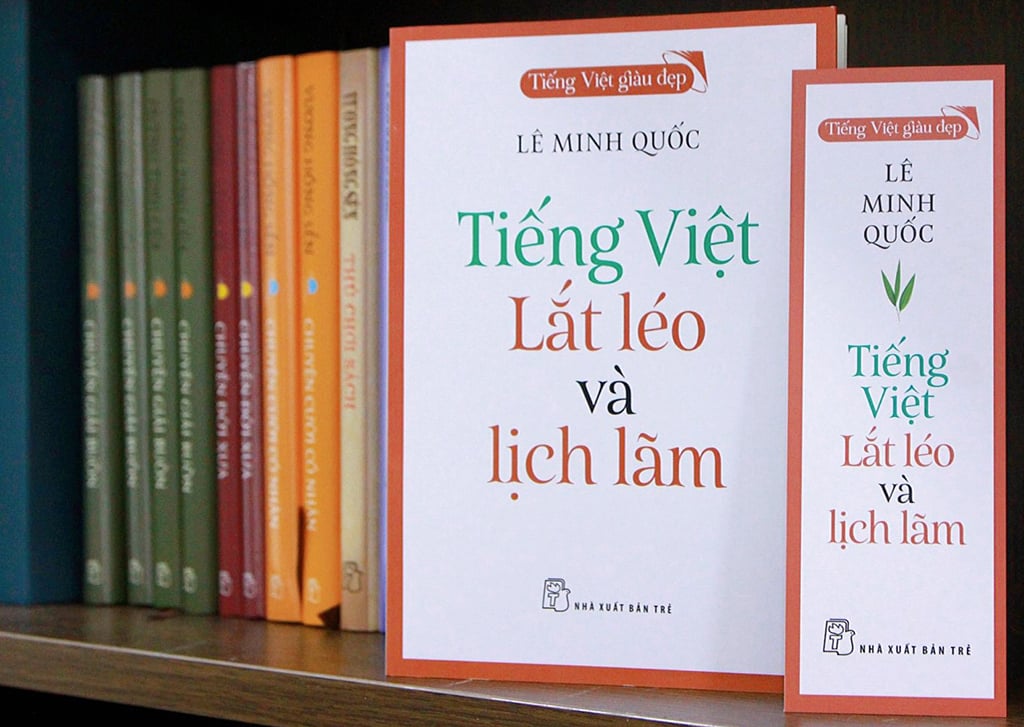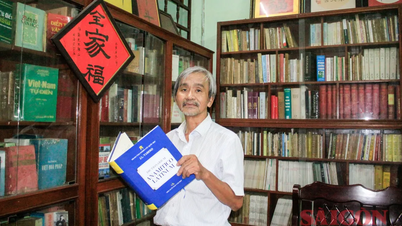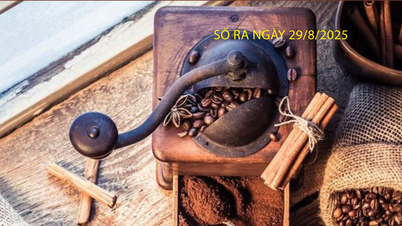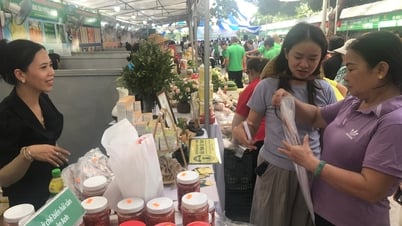' PHOENIX PETS ON THE BRANCH OF BAKERY...'
In describing Vietnamese, there is a popular saying "storms and tempests are not as bad as Vietnamese grammar" to express the complexity of words. Yet, the "young" researcher Le Minh Quoc chose this "tricky" land to explore. From the book "Tricky Vietnamese" (2017), Vietnamese culture seen from Vietnamese (3 volumes, 2021), the more readers delve into the unpredictable changes of Vietnamese, from the language of their ancestors to the language of today's Gen Z and Gen Alpha, the more interesting it is, especially when the author combines it with poetry and folk songs, making it even more humorous.

The cover of the Vietnamese book is sophisticated and elegant.
As simple as talking about the two words "flirting" that are popular among young people, the tricky and elegant Vietnamese is also written in the Gen Z tone: "After a period of time of bragging to the highest level, that guy was crazy about Ms. X. Even though he was just a low-class guy, he was so talkative, he bragged to the sky, bragged like Binh Da firecrackers, Nam O firecrackers, he bragged like a lotus seed, as if he was a "handsome guy". Observing for a while, Ms. X's mother felt itchy and teased: Are you flirting with my daughter?".
So, the word "thinh" that goes with the word "thà" sounds like this "pair of friends" is not very good for girls? The author explains: "Thà thính" means the act of pretending to attract, entice, and appeal to others so that they develop feelings for you. It is not by chance that the word "thinh" goes with "tha". Because "thinh" is roasted rice, finely ground like powder, has a fragrant smell and is used as an additive in some foods, but it is also used to lure fish, shrimp, and prawns into a te, into a net or to marinate fish sauce. There is a proverb that says "Release the fish to hunt iron, catch a big fish; Release the tiger back to the forest; Release the bait to catch the shadow"... "Thà" means to let go or let out of a confined place, without being herded: release the fish, release the chicken...".
So, what about letting the goat loose? Oh my, this curiosity is getting confusing. The author "dissolves" it immediately: "Goat is a slang term for those who are lustful, lustful, always looking for ways to flirt, chase... Reaching the level of a martial arts master will surely be titled a goat, a goat, a "three-five" goat. That's why the Southern folk song has the saying: "The phoenix perches on a sapodilla branch/The god won't let the goats loose". It proves that, flirting or spreading bait is easy to get... a lover, but... letting the goat loose is not good, since ancient times it has been condemned as a "godly object", so everyone who knows the words should "be careful with firewood".
THE GRACEFUL TRANSFORMATION OF THE VIETNAMESE LANGUAGE
Looking at his wife busily cooking rice in the kitchen, researcher Le Minh Quoc felt very sorry but encountered two folk songs of the Southern people that are causing controversy online: "At noon, I felt hungry and craved rice/Looking at my sister-in-law's thighs, I thought it was braised shrimp" and was very worried. Why is my sister-in-law's thighs compared to braised shrimp? Surely it is very delicious? One opinion could be that the braised style follows the culinary art of the Chinese/Chinese people. The rest, based on the opinion of writer Binh Nguyen Loc, "the word "tàu" in the Western language means salty, sweet, and bland". Which is correct?

Poet, researcher Le Minh Quoc
Author Le Minh Quoc analyzed: "In the past, in the general consciousness of the Vietnamese people, "Generally, any good goods, any good things are called Chinese", according to Dai Nam Quoc Am Tu Vi (1895). "Tau" is a proper noun, but when used in braised meat, boiled meat in general, it is an adjective to indicate the elaborate, top/extremely excellent way of preparing that dish: braised fish, braised meat, braised shrimp are easy to braise, but once accompanied by the word "tau", the preparation must be more laborious, more methodical and of course more delicious and "classy", taking more time. Over the years, "tau" in the culinary art of the Vietnamese has lost its meaning, so we confuse "tau" with "Tau"; or think that "tau" is salty, sweet and bland".
In the article Saying That's Not That, the author goes into depth to prove the talent of the Vietnamese in borrowing imported words to create in their own way, such as the phrase "twisting the bolt" (borrowing the French boulon) is as clear as the six humorously expressed vọng cổ verses. What about "hến ngày lại nám"? "I understand that xuất đen is exactly from lại hỏi. Why not anything else but xuất đen? This is because of eating the very famous pho with its typical "accessories" such as xuất đen bông, xuất đen béo... It's delicious". Then, the nuances of that farewell sentence are very lively. Not to mention, the people also "invented" the Vietnamese language from two words into four, to evoke humorous, sarcastic nuances, such as: hương hao hương vung, giáo dục giam xui, văn nghe văn ginger, trí thức trí ngủ, học học thực. The language of the @ era has been further upgraded: "the flea is awesome", "the seven lady is awesome". Even au revoir (French) means see you again, but the Vietnamese goodbye just borrowed au re (pronounced ô rờ) and attached it with lui to create a joke: "Darling, ô rờ lui nhe".
Southerners are so good at putting "O-ro-voa" into folk songs: "O-ro-voa here, goodbye friends, leave/The sun has not yet set, the rain is coming" which makes the author of the tricky and elegant Vietnamese language exclaim: "So witty, extremely tricky but very charming".
Source: https://thanhnien.vn/rong-choi-voi-tieng-viet-theo-cach-le-minh-quoc-185240830220933915.htm




![[Photo] President Luong Cuong receives Speaker of the New Zealand Parliament Gerry Brownlee](https://vphoto.vietnam.vn/thumb/1200x675/vietnam/resource/IMAGE/2025/8/29/7accfe1f5d85485da58b0a61d35dc10f)

























![[Photo] Hanoi is ready to serve the occasion of the 80th National Day Celebration on September 2nd](https://vphoto.vietnam.vn/thumb/1200x675/vietnam/resource/IMAGE/2025/8/29/c838ac82931a4ab9ba58119b5e2c5ffe)





























































Comment (0)